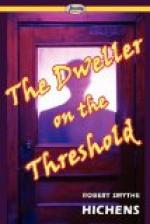“And why not?” said Chichester. “Rector—curate—archbishop—what does it matter? The point is not what rank in the hierarchy a man has, but what, and how, does he see? A street boy may perceive a truth that a king is blind to. At that moment the street boy is greater than the king. Do you deny it?”
“No,” said Malling, amazed at the curate’s excitement, but showing no astonishment.
“But it’s a terrible thing to see too clearly!” continued Chichester, almost as if talking to himself, absorbed. “A terrible thing!”
He looked up at Malling, and almost solemnly he said:
“Are you still going on with all those investigations?”
“When I have any spare time, I often spend some of it in that sort of work,” answered Malling, lightly.
It was his way to make light of his research work, and indeed he seldom mentioned it unless he was forced to do so.
“Do you think it is right?” said Chichester, earnestly.
“Right?”
“To strive to push one’s way into hidden regions.”
“If I didn’t think it right I shouldn’t do it,” retorted Malling, but without heat.
“And—for clergymen?” questioned Chichester, leaning forward, and dropping his small, thin hands down between his knees.
“What do you mean?”
“Do you think it right for clergymen to indulge themselves—for it is indulgence—in investigations, in attempts to find out more than God has chosen to reveal to us?”
The man of science in Malling felt impatient with the man of faith in Chichester.
“Does it never occur to you that the anima mundi may have hidden certain things from the minds of mortals just in order to provide them with a field to till?” he said, with a hint of sarcasm. “Wasn’t the fact that the earth revolves round the sun, instead of the sun round the earth, hidden from every living creature till Galileo discovered it? Do you think Galileo deserved our censure?”
“Saul was punished for consulting the witch of Endor,” returned Chichester. “And the Roman Catholic Church forbids her children to deal in occult things.”
“You can’t expect a man like me, a disciple of Stepton, to take the Roman Catholic view of such a matter.”
“You are not a clergyman,” said Chichester.
Malling could not help smiling.
“You think the profession carries with it certain obligations,” he said. “No doubt it does. But I shall never believe that one of them is to shut your eyes to any fact in the whole scheme of Creation. Harm can never come from truth.”
“If I could believe that!” Chichester cried out.
“Do you mean to tell me you don’t believe it?”
Chichester looked at Malling for quite a minute without replying. Then he got up, and said, with a changed voice and manner:
“If the rector doesn’t come to see me I shall have to go. Sunday is not a holiday, you know, for us clergymen.”




